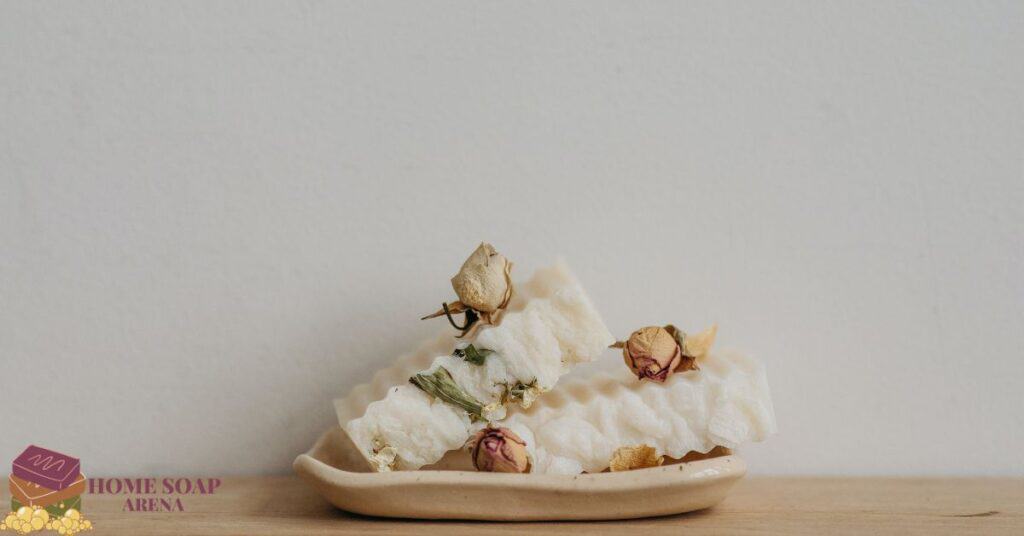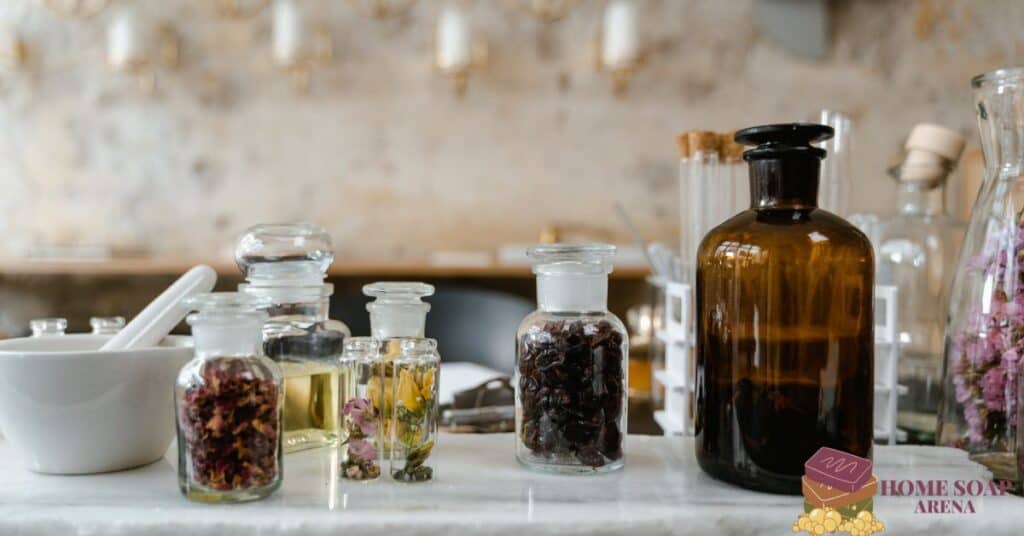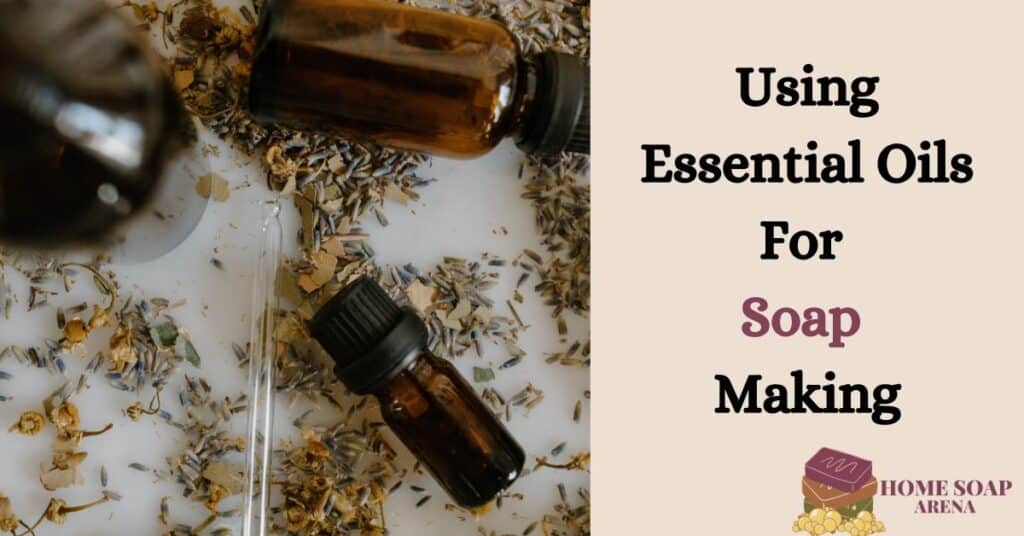Table of Contents
- What Are The Benefits Of Tallow Soap
- What Are The Essential Oils For Tallow Soap?
- How Much Superfat For Tallow Soap?
- Conclusion
Are essential oils used in tallow soap? Yes! Tallow soap is a traditional soap made from animal fat, typically beef or sheep.
Tallow soap has many benefits for the skin, such as being hard, creamy, gentle, and moisturizing.
However, some people may find the scent of tallow soap unpleasant or too bland. That’s where essential oils come in handy!
I’ve been making soap for a while using a blend of tallow, coconut, and olive oil.
In this blog post, I will share some of the best essential oils for tallow soap making, some tips and recipes to help you get started.
What Are The Benefits Of Tallow Soap
Tallow soap is a fantastic option for anyone looking for a high-quality soap that provides numerous benefits for the skin.
This type of soap is made from rendered beef or mutton fat, and it has been used for ages to keep skin healthy and hydrated.
One of the main benefits of tallow soap is its highly moisturizing and can help prevent dry skin.
Additionally, it is gentle and soothing, making it an excellent choice for people with sensitive skin.
Another advantage of tallow soap is that it is compatible with the natural oils that our skin produces, which means it can provide intense hydration and nourishment without clogging pores or causing breakouts.
This type of soap also contains nutrients that can help to repair and heal the skin, such as vitamins A, D, E, and K, conjugated linoleic acid (CLA), and omega-3 fatty acids.
Tallow soap also has anti-inflammatory and antimicrobial properties that can reduce inflammation and prevent infections.
It is long-lasting and economical, so it’s a great investment for anyone looking for a high-quality soap that will last a long time.
Finally, tallow soap produces a rich and creamy lather that cleanses the skin without stripping it of its natural oils.
What Are The Essential Oils For Tallow Soap?
Here are some of the best essential oils for tallow soap making based on their scent, properties, and compatibility with tallow:
Lavender: Lavender is one of the most popular and versatile essential oils for soap making. It has a soothing floral scent that can help calm the mind and body.
Lavender also possesses antibacterial, anti-inflammatory, and healing qualities that can help the skin.
Lavender blends well with other essential oils, such as rosemary, lemon, peppermint, and bergamot.
Also, oils like frankincense, wild orange, and chamomile are essential oil that goes with tallow soap.
Lemon: Lemon is a bright and refreshing citrus essential oil that can add a burst of freshness to your tallow soap.
Lemon has antiseptic, astringent, and bleaching properties that help cleanse and lighten the skin.
It also has a mood-boosting effect that can energize and uplift you.
Lemon blends well with other citrus essential oils, such as orange, grapefruit, and lime.
Rosemary: Rosemary is a herbaceous and refreshing essential oil that can enhance the scent and benefits of your tallow soap.
Rosemary has antimicrobial, anti-inflammatory, and antioxidant properties that help protect and nourish the skin.
It has a stimulating effect that can improve memory and concentration.
It blends well with other herbal essential oils, such as sage, thyme, and basil.
Peppermint: Peppermint is a cool and minty essential oil that can add a touch of freshness and excitement to your tallow soap.
Peppermint is known for its analgesic, antiseptic, and decongestant properties that can help alleviate pain, infection, and congestion.
Additionally, the refreshing aroma of peppermint can also help to awaken and energize you, making it a popular choice for aromatherapy and other wellness practices.
Peppermint blends well with other minty or spicy essential oils, such as eucalyptus, spearmint, and ginger.
Bergamot: Bergamot is a sweet and fruity citrus essential oil that can add a touch of class and sophistication to your tallow soap.
Bergamot is a versatile essential oil known for its antibacterial, anti-inflammatory, and antidepressant properties.
Its ability to combat infection, inflammation, and depression makes it a popular choice among many individuals.
Additionally, bergamot oil has a calming and balancing effect that can help harmonize emotions and hormones.
When combined with other floral or woody essential oils, such as lavender, rose geranium, or sandalwood, bergamot can provide an even more pleasant and soothing aroma.
How Much Superfat For Tallow Soap?
Superfat is the extra fat or oil that remains after the soap-making process. It gives the soap extra moisturizing and conditioning properties.
The superfat percentage is calculated based on the amount of lye and fat or oil in the soap recipe. More on superfat here.
Different oils and fats have different saponification values, which means they react with lye differently and produce different amounts of soap.
Tallow has a high saponification value, producing a lot of soap per gram of fat.
However, it can also be drying or harsh if there is insufficient superfat in the recipe.
The amount of superfat added to tallow soap is a matter of personal preference and depends on the intended use of the soap.
Typically, a superfat percentage ranging from 5% to 8% is recommended for tallow soap.
A lower superfat percentage will give you a more rigid and cleansing soap, while a higher superfat rate will provide you with a softer and more moisturizing soap.
If you are using pure tallow for your soap, consider using a higher superfat percentage, such as 8%, to balance out the drying effect of tallow.
When tallow with other oils, such as coconut or olive oil, consider using a lower superfat percentage, such as 6%, to prevent your soap from being too soft or oily.
Use online calculators or charts to help you determine the amount of lye and water you need for your desired superfat percentage and oil combination.
To reduce the smell of Tallow, for soap making, you can add some essential oils or fragrance oils to mask the smell.
Some popular choices are lavender, citrus, mint, or rosemary.
You can also use other natural ingredients, such as clays, herbs, or honey, to enhance the color, texture, and benefits of your soap.
Conclusion
With the understanding of essential oils to use in tallow soap plus its natural ingredients and many benefits for the skin.
Pay attention to the superfat percentage and the smell of tallow to make sure your soap is balanced and pleasant.
Beef tallow and sheep tallow are the most preferred fats for soap making, so be sure to look for those ingredients when selecting a tallow soap.



